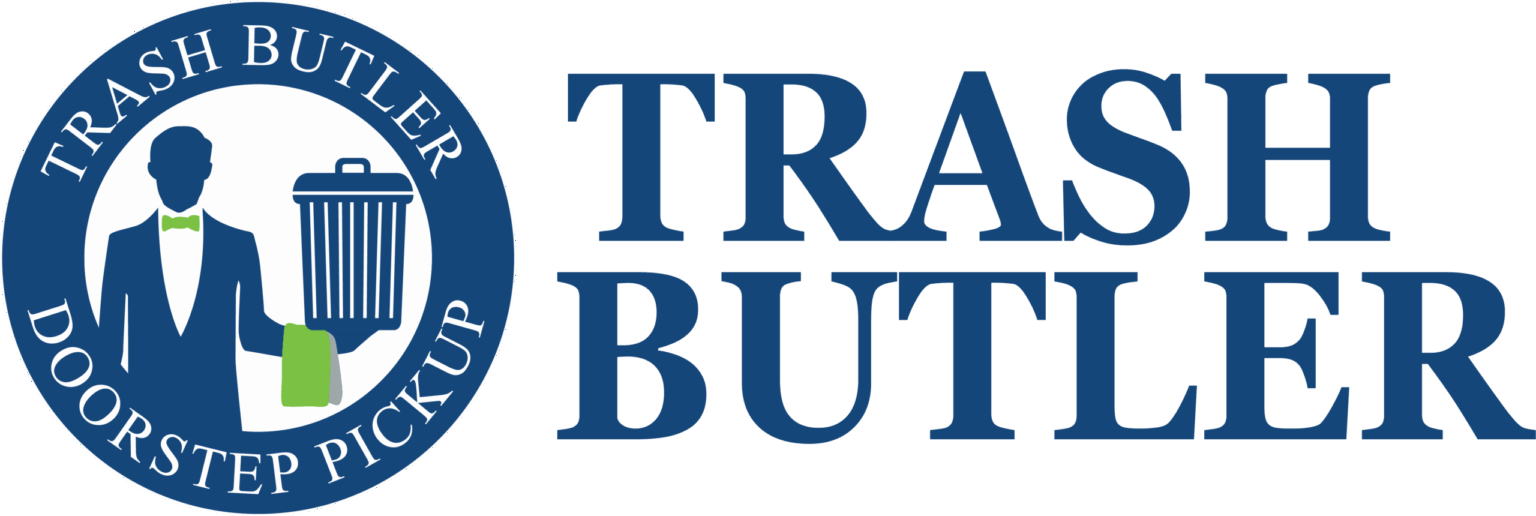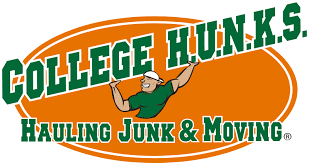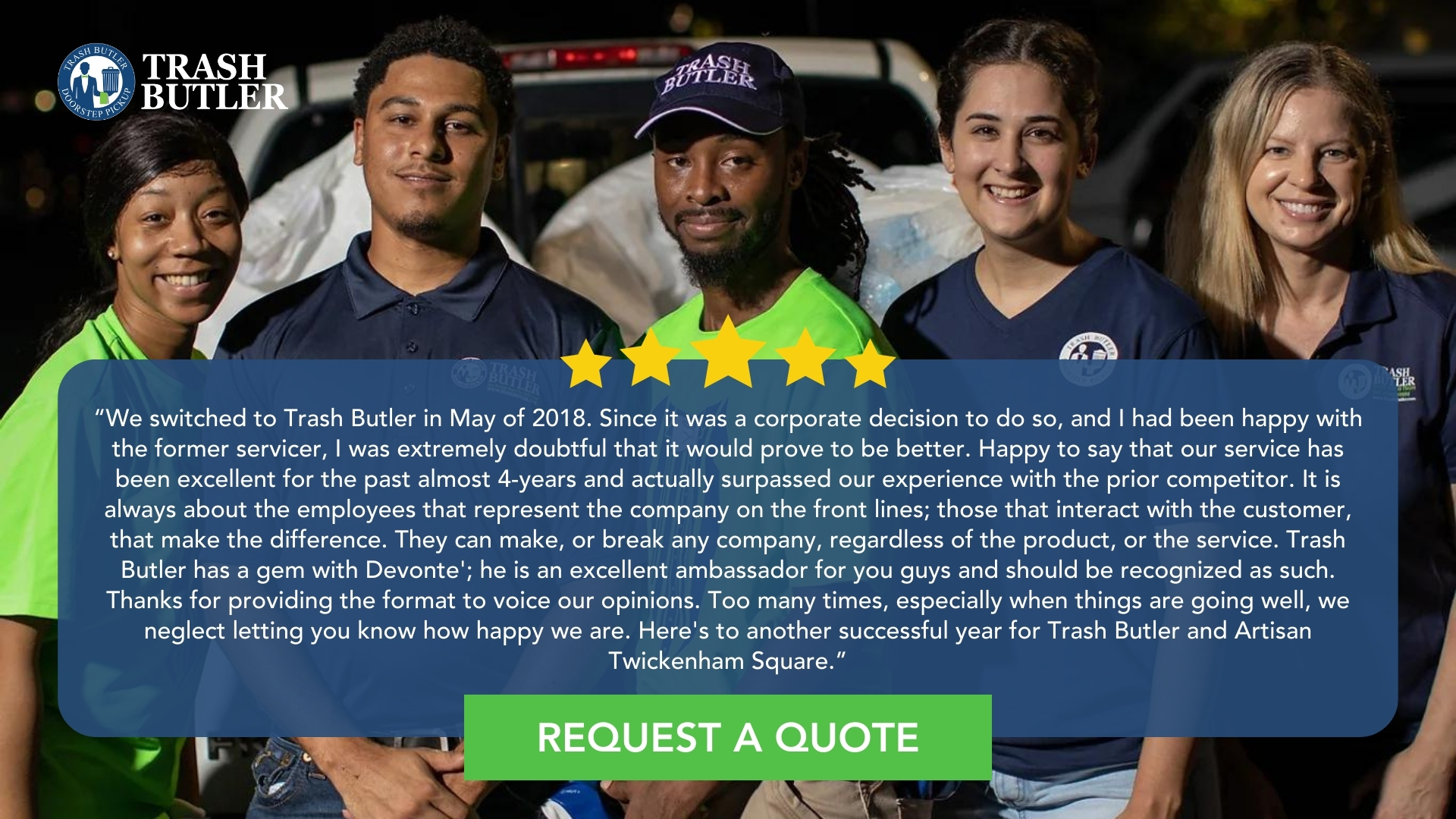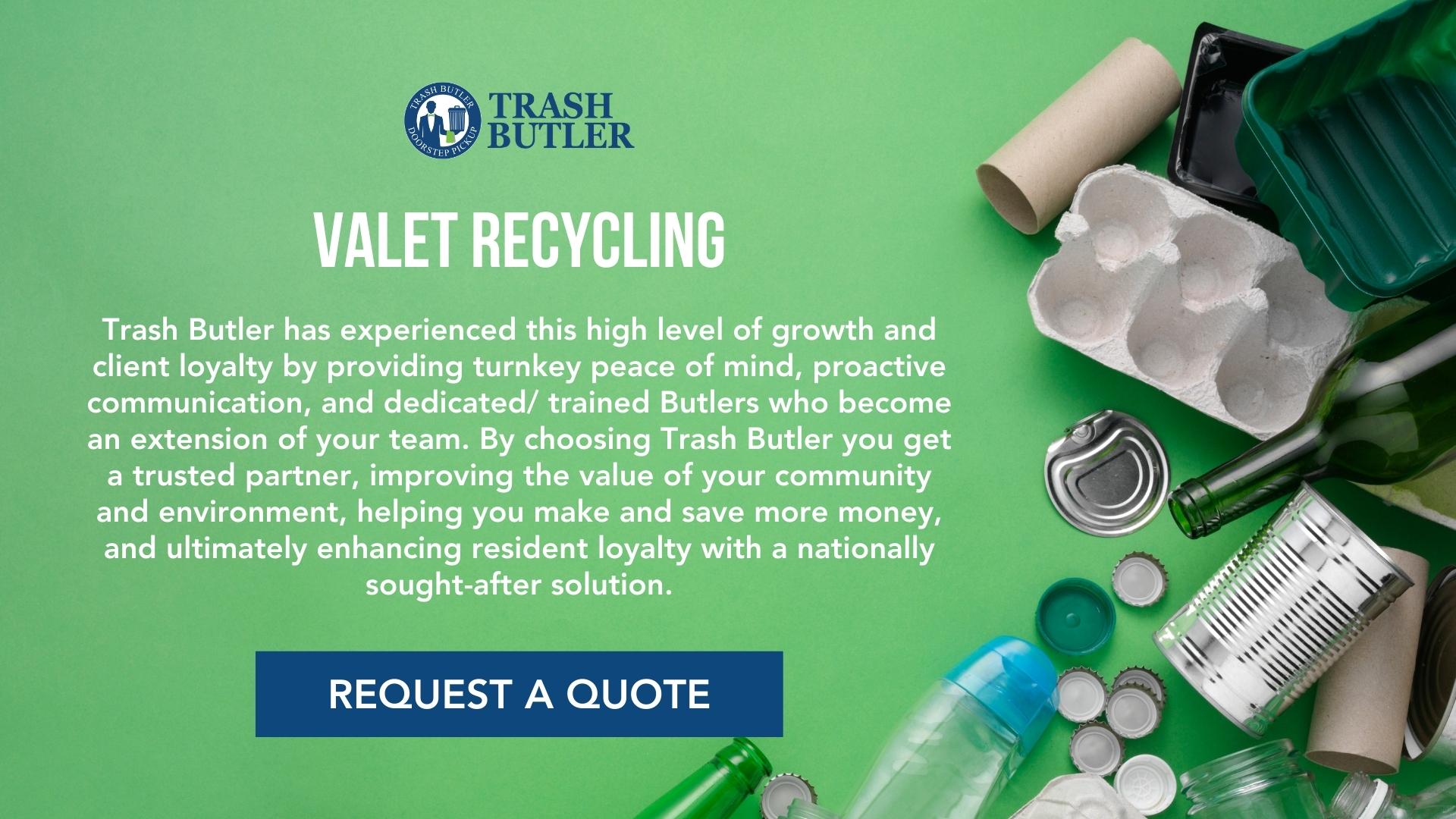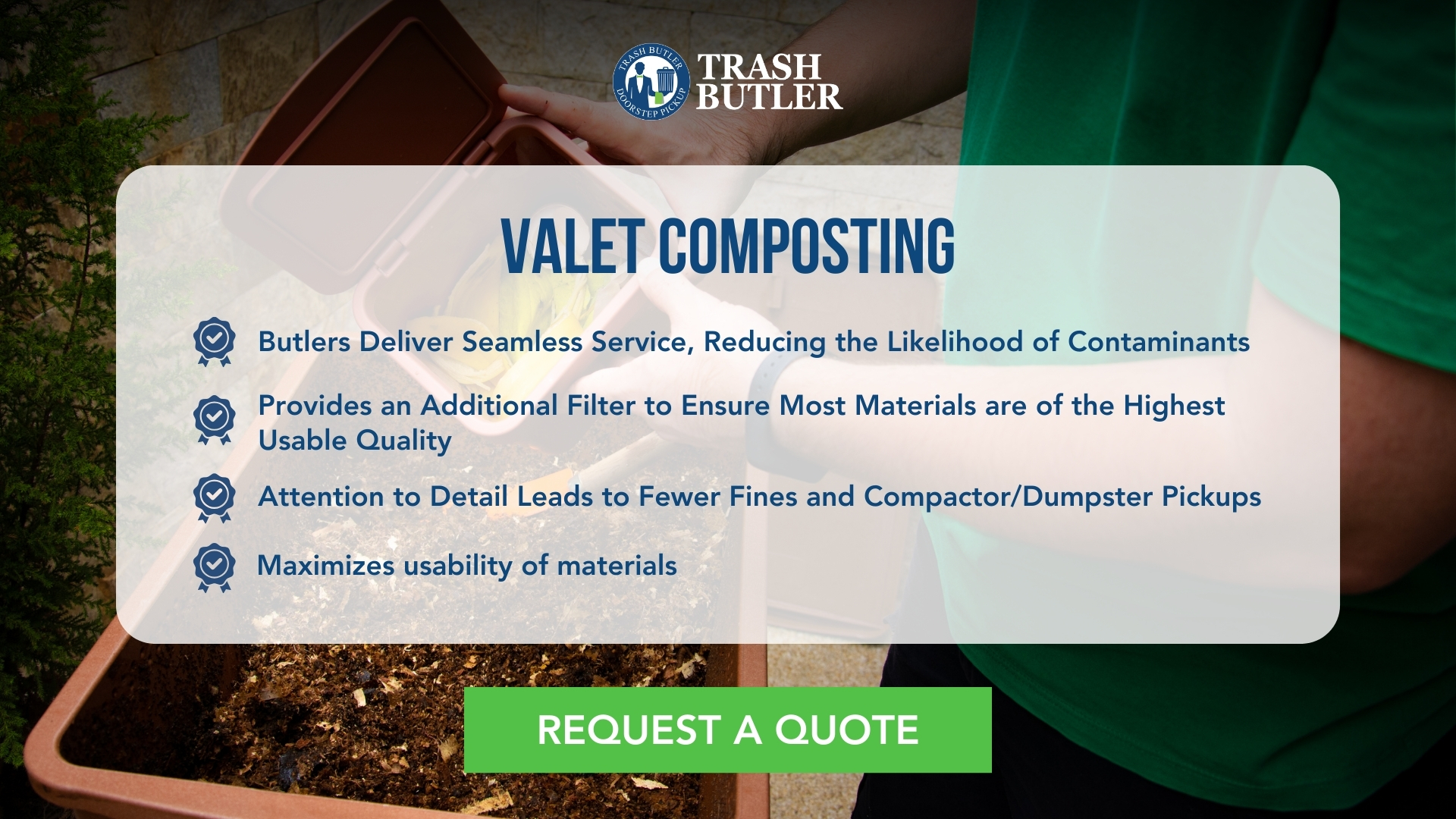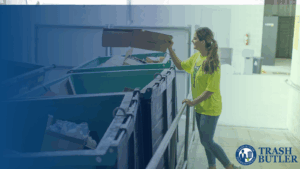Key Takeaways:
- SB 1383 Mandates Organic Waste Diversion: California’s SB 1383 requires property managers and landlords of multi-family (5+ units) and commercial properties to implement organic waste recycling to reduce methane emissions.
- Compliance Involves Clear Requirements: Key responsibilities include providing accessible organic waste bins, educating residents annually on proper sorting, monitoring for contamination, and maintaining compliance records.
- Partnering Simplifies Compliance & Avoids Fines: Failing to comply with CA sb 1383 can result in fines. Partnering with services like Trash Butler streamlines waste collection, resident education, and reporting, ensuring seamless adherence to the CA food waste law.
Staying compliant with new regulations can feel overwhelming, especially when juggling day-to-day operations, resident needs, and property upkeep. SB 1383, California’s groundbreaking food waste law, adds another responsibility for property managers and landlords.
But compliance doesn’t have to be complicated. With the right partner and a clear understanding of what’s required, you can meet state mandates, avoid costly fines, and build a cleaner, more sustainable community. In this guide, we’ll break down SB 1383 in simple, actionable terms and show you how Trash Butler makes compliance seamless from day one.
What Is SB 1383 And Why Was It Introduced In California?
California Senate Bill 1383 (SB 1383) is a landmark piece of legislation aimed at reducing the state’s environmental impact by addressing organic waste in landfills. Signed into law in 2016, SB 1383 requires significantly reducing short-lived climate pollutants, explicitly focusing on organic materials like food waste and yard debris.
The Main Goal Of SB 1383: Cutting Methane Emissions
One of the primary drivers for SB 1383 is to cut methane, a potent greenhouse gas produced when organic waste decomposes in landfills. By diverting organic materials from landfills, the law directly targets one of California’s most significant sources of methane emissions.
Statewide Organics Recycling Mandate
SB 1383 establishes a statewide mandate for businesses, property managers, and residents to separate organic waste from regular trash. The law sets ambitious targets: a 50% reduction in organic waste disposal from 2014 levels by 2020, and a 75% reduction by 2025.
Why Target Property Managers And Landlords?
Multi-family property owners and managers are included explicitly because apartments and condos represent much of California’s housing. Ensuring compliance in these communities is critical for meeting the state’s waste diversion and climate goals.
Who Does SB 1383 Apply To And What Properties Are Affected?
SB 1383 casts a wide net when it comes to compliance. Understanding whether your property is covered by these regulations is crucial for seamless operations and legal peace of mind.
Multi-Family Residences
The law applies to any multi-family property with five or more units. This includes apartment communities, condominiums, and townhomes. Property managers and landlords in these settings must provide adequate access to organics and recycling collection.
Commercial Properties
SB 1383 also applies to commercial properties, including offices, retail spaces, restaurants, and mixed-use developments. Owners or managers must ensure that employees, tenants, and customers have access to proper waste separation.
Exemptions
While SB 1383 covers most multi-family and commercial properties, small residential buildings (four units or fewer) have different requirements and may not be subject to the same standards. Always check your local jurisdiction for specific exemptions or phased implementations.
What Are The SB 1383 Requirements For Property Managers?
California’s SB 1383 brings significant new responsibilities for property managers and landlords in multi-family apartment communities. Understanding these requirements is crucial to ensure compliance and promote sustainability.
Provide Access To Organics Recycling
Property managers must provide residents with convenient access to an organic recycling program. This means ensuring the availability of green bins or carts for food scraps, yard waste, and other organic materials. These bins should be as accessible as regular trash and recycling facilities on the property.
Educate Residents And Staff
Regular education is a central part of SB 1383 compliance. Property managers must inform new and existing residents, janitorial teams, and maintenance staff about correctly separating organics, recyclables, and landfill waste. This education must be ongoing and provided at least annually.
Monitor And Prevent Contamination
Monitoring is an active requirement under SB 1383. Property managers must routinely check for contamination in all waste streams, ensuring organics bins do not contain prohibited items. Corrective educational information must be provided to the responsible parties if contamination occurs.
Maintain Records
Property managers are expected to maintain records documenting their compliance efforts. This includes keeping track of educational materials distributed, monitoring activities, and any corrective actions taken. Having organized records is essential in case of inspection by local authorities.
Comply With Local Ordinances
Many cities and counties have their own SB 1383 regulations that build upon state requirements. Property managers must stay updated on local mandates and make any necessary changes to their waste reduction programs to remain compliant.
What Happens If A Property Fails To Comply With SB 1383?
SB 1383 sets strict requirements for the collection and diversion of organic waste. Non-compliance can have significant consequences for property managers and landlords overseeing multi-family communities. Here’s what you need to know:
Fines And Penalties
State and local regulators are authorized to issue administrative fines to property owners and managers who do not comply with SB 1383. The fines can vary based on the severity and duration of the violation, often ranging from hundreds to thousands of dollars per day until the issue is corrected.
Local Enforcement Actions
Local jurisdictions are required to monitor compliance and may conduct inspections at properties to ensure proper organic waste separation and collection. If deficiencies are found, enforcement officers may issue warnings, order corrective measures, or escalate to official citations.
Increased Regulatory Oversight
Repeated violations or systemic non-compliance can lead to ongoing oversight and more frequent inspections. This can mean additional administrative work and costs as properties are tasked with demonstrating their compliance efforts.
Potential Damage To Reputation
Failing to comply with SB 1383 regulations can also impact the reputation of property managers and landlords among tenants and within the industry, which can affect resident retention and the marketability of the community.
Are There Any Exemptions Or Waivers For SB 1383 Requirements?
Understanding SB 1383’s requirements is critical, but knowing if there are exemptions or waivers can help property managers and landlords plan effectively. While the law broadly applies to most residential and commercial properties, there are specific circumstances where exemptions or waivers may be available.
Low Population Waivers
Some communities with very low populations in census tracts may qualify for exemptions from specific SB 1383 requirements. The local jurisdiction typically grants these waivers based on particular population thresholds and remoteness. Property managers should check with their local agency for eligibility.
De Minimis Waivers
Properties that generate minimal amounts of organic waste, below a set limit, may be eligible for a “de minimis waiver.” Local authorities define the exact thresholds, but generally target businesses or properties with exceptionally low organic waste generation.
Physical Space Waivers
In some instances, properties may be eligible for a physical space waiver if they can demonstrate that there is not enough room for the separate organic waste containers required by SB 1383. This often requires submitting detailed documentation and site plans to the local jurisdiction for review.
How Can CA Property Managers Simplify SB 1383 Compliance?
Navigating SB 1383 can feel overwhelming, but property managers have a variety of strategies to cut through the complexity. The right approach ensures compliance, benefits residents, and reduces operational headaches.
Streamline Waste Collection Systems
Set up clearly labeled and easily accessible bins for landfill, recycling, and organics in all common areas. Ensure signage uses clear, multilingual instructions and visuals to help residents sort their waste correctly.
Educate And Engage Residents
Launch recurring educational campaigns, such as flyers, brief meetings, or digital bulletins, to explain how waste sorting works and why it’s important. Encouraging resident participation is key to reducing contamination and achieving compliance.
Monitor And Adjust Practices
Regularly check bins for contamination and track common recycling mistakes. Use this data to tailor future communication or even adjust bin placement if certain areas are problematic.
Partner With Professionals
Engage local haulers or recycling consultants for periodic training sessions, audits, or feedback on your current waste management approach. Leveraging their expertise can help catch issues early and keep your program on track.
How Can Trash Butler Support SB 1383 Implementation?
At Trash Butler, we know that effectively complying with SB 1383 requires more than just good intentions; it demands a practical, hands-on strategy, especially for multifamily communities. We offer a turnkey solution that simplifies compliance through expert support, resident education, and consistent service. Our professional valet trash and recycling services are designed to make SB 1383 compliance possible, manageable, and reliable.
Streamlined Waste Collection And Sorting
Our doorstep collection service removes the friction from waste sorting. We increase participation and reduce contamination by making it easy for residents to separate recyclables and organics from landfill-bound materials. Our trained valets ensure each pickup supports the organic waste diversion goals outlined in SB 1383.
Resident Education And Engagement
Trash Butler provides custom signage, educational guides, and training resources tailored for your community. We help residents and staff understand what goes in each bin, proactively driving better sorting habits and lowering the risk of violations or fines.
Regular Monitoring And Compliance Reporting
We don’t just collect, we track. Our teams conduct routine audits to monitor contamination levels and service quality, while our reporting tools give property managers clear, actionable data. These reports not only prove your community’s compliance with SB 1383 but also help you identify ongoing opportunities for improvement.
Final Thoughts
SB 1383 marks a pivotal step toward California’s environmental goals, but it doesn’t have to be a burden for property managers and landlords. With a clear understanding of what’s required—and the support of services like Trash Butler, compliance becomes a practical, streamlined process. From educating residents to ensuring proper bin access and monitoring contamination, taking proactive steps now keeps you in line with state mandates. It shows your commitment to sustainability and community well-being. Partnering with a professional waste management service ensures your property is compliant, clean, efficient, and future-ready.
Request a Quote: Fill out a form to see how Trash Butler™ can benefit your community.
Read also:
- California’s Composting Law: Everything Property Managers Need To Know
- How Valet Trash Reduces Waste Overflow And Dumpster Issues In Apartments
- Why Multifamily Properties With Valet Trash See Fewer Pest Problems
Frequently Asked Questions About What Is SB 1383? A Simple Guide For Property Managers And Landlords
When did SB 1383 go into effect?
SB 1383 officially went into effect on January 1, 2022. Since that date, multi-family apartment communities, property managers, and landlords must comply with the new organic waste and recycling mandates outlined in the legislation.
What are the responsibilities of landlords under SB 1383?
Landlords and property managers must provide tenants with access to organics recycling and appropriate waste containers, ensure proper labeling and signage, and educate tenants on correct sorting of waste. They are also responsible for monitoring compliance and maintaining proper records to stay in line with SB 1383 regulations.
How should property managers educate tenants about SB 1383?
Effective education involves distributing clear written guidelines, posting signage in common areas, holding orientation sessions for new tenants, and regularly communicating reminders about organic waste sorting. Partnering with a professional valet trash and recycling service, like Trash Butler, can further streamline tenant education and compliance.
Is there state support for implementing SB 1383?
Yes. The state offers resources, toolkits, and grants to help property managers and landlords adapt to SB 1383 requirements. Local governments may also offer additional support, including technical assistance and outreach materials designed to simplify the transition.
Can property managers opt out of SB 1383 requirements?
No, property managers and landlords cannot opt out of SB 1383 requirements. Compliance is mandatory for all multi-family residences with five or more units throughout California. Each community must adhere to the law or risk enforcement actions and penalties.
What documentation is needed for SB 1383 compliance?
Property managers must retain records demonstrating compliance, including contracts with recycling services, documentation of waste container placement and labeling, and logs of tenant education activities. These documents should be available upon request for inspection by local jurisdictions or state authorities.
Are there any tax benefits for complying with SB 1383?
At this time, there are no direct tax credits or deductions specific to SB 1383 compliance. However, some local jurisdictions may offer financial incentives or grants related to recycling and sustainability improvements. It’s advisable to consult with local agencies or a tax professional for the latest opportunities.

